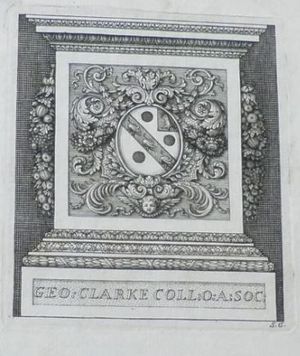Difference between revisions of "George Clarke 1661-1736"
| Line 17: | Line 17: | ||
*Wilkinson, C. H., Worcester College Library, ''Oxford Bibliographical Society Proceedings and Papers'' 1 (1927), 263-320. | *Wilkinson, C. H., Worcester College Library, ''Oxford Bibliographical Society Proceedings and Papers'' 1 (1927), 263-320. | ||
*[https://worcestercollegelibrary.wordpress.com/tag/george-clarke/ Worcester College Library Special Collections pages]. | *[https://worcestercollegelibrary.wordpress.com/tag/george-clarke/ Worcester College Library Special Collections pages]. | ||
| + | *[http://prints.worc.ox.ac.uk/ Catalogue of the Clarke print collection, Worcester College]. | ||
</div> | </div> | ||
Revision as of 01:58, 27 December 2020
George CLARKE 1661-1736
Biographical Note
Born in London, son of Sir William Clarke, secretary at war to the government. BA Brasenose College, Oxford 1679, fellow of All Souls 1680, BCL 1686. MP for Oxford University 1685, and he was regularly elected to Parliament for various constituencies thereafter; like his father, he was secretary at war during the 1690s and held various administrative posts, but was out of favour after voting against the government in 1705, and again after the accession of George I in 1714. He developed particular interests in architecture, and was an influential voice in many major building projects in Oxford, and elsewhere, around the turn of the 18th century.
Books
Clarke inherited books from his father and went on to assemble a significant and wide-ranging library, celebrated and consulted by others during his lifetime; today, it is noted particularly for its holdings of history, literature and architecture. He also had many thousands of prints and paintings. He left all his collections to Worcester College, Oxford.
Characteristic Markings
Clarke used an engraved armorial bookplate (Franks 5924); he also regularly inscribed his titlepages with a "GC" monogram.
Sources
- Clayton, Timothy. "Clarke, George (1661–1736), politician and architect." Oxford Dictionary of National Biography.
- Gambier Howe, E. R. J. Franks bequest: catalogue of British and American book plates bequeathed to the ... British Museum. London, 1903.
- Wilkinson, C. H., Worcester College Library, Oxford Bibliographical Society Proceedings and Papers 1 (1927), 263-320.
- Worcester College Library Special Collections pages.
- Catalogue of the Clarke print collection, Worcester College.
